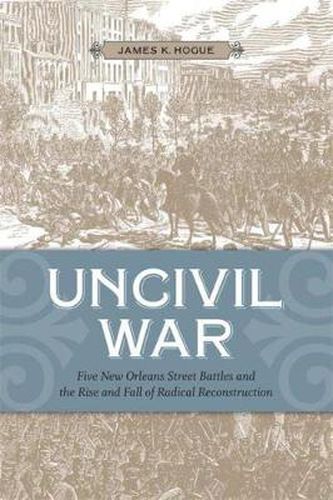Readings Newsletter
Become a Readings Member to make your shopping experience even easier.
Sign in or sign up for free!
You’re not far away from qualifying for FREE standard shipping within Australia
You’ve qualified for FREE standard shipping within Australia
The cart is loading…






This title is printed to order. This book may have been self-published. If so, we cannot guarantee the quality of the content. In the main most books will have gone through the editing process however some may not. We therefore suggest that you be aware of this before ordering this book. If in doubt check either the author or publisher’s details as we are unable to accept any returns unless they are faulty. Please contact us if you have any questions.
No other Reconstruction state government was as chaotic or violent as Louisiana’s, located in New Orleans, the largest southern city at the time. James K. Hogue explains the unique confluence of demographics, geography, and wartime events that made New Orleans an epicenter in the upheaval of Reconstruction politics and a critical battleground in the struggle for the future of southern society. No other Reconstruction state government was as chaotic or violent as Louisiana’s, located in New Orleans, the largest southern city at the time. James K. Hogue explains the unique confluence of demographics, geography, and wartime events that made New Orleans an epicenter in the upheaval of Reconstruction politics and a critical battleground in the struggle for the future of southern society.
Hogue characterizes Reconstruction in Louisiana as a continuation of civil war, waged between well-organized and well-armed forces vying to control the state’s government. He details five key New Orleans street battles, in which elite Confederate veterans played central roles, and gives an in-depth account of how the Republican state government raised militias and a state police force to defend against the violence. In response, a white supremacist movement arose in the mid-1870s and finally overthrew the Republicans. The occupation of Louisiana by federal troops from 1862 to 1877 was the longest of its kind in American history. Not coincidentally, Hogue argues, one of the longest unbroken periods of one-race, one-party dominance in American history followed, lasting until 1972.
Uncivil War reveals that the long-term military impact of the South’s occupation included twenty-five years of crippled War Department budgets inflicted by southern congressmen who feared another Reconstruction. Within Louisiana, the biracial Republican militias were dismantled, leaving blacks largely unarmed against future atrocities; at the same time, the nucleus of the state’s White Leagues became the Louisiana National Guard, which defended the
Redeemer
government’s repressive labor policies. White supremacist victory cast its shadow over American race relations for almost a century.
Moving between national, state, and local realms, Uncivil War demystifies the interplay of force and politics during a complex period of American history.
$9.00 standard shipping within Australia
FREE standard shipping within Australia for orders over $100.00
Express & International shipping calculated at checkout
This title is printed to order. This book may have been self-published. If so, we cannot guarantee the quality of the content. In the main most books will have gone through the editing process however some may not. We therefore suggest that you be aware of this before ordering this book. If in doubt check either the author or publisher’s details as we are unable to accept any returns unless they are faulty. Please contact us if you have any questions.
No other Reconstruction state government was as chaotic or violent as Louisiana’s, located in New Orleans, the largest southern city at the time. James K. Hogue explains the unique confluence of demographics, geography, and wartime events that made New Orleans an epicenter in the upheaval of Reconstruction politics and a critical battleground in the struggle for the future of southern society. No other Reconstruction state government was as chaotic or violent as Louisiana’s, located in New Orleans, the largest southern city at the time. James K. Hogue explains the unique confluence of demographics, geography, and wartime events that made New Orleans an epicenter in the upheaval of Reconstruction politics and a critical battleground in the struggle for the future of southern society.
Hogue characterizes Reconstruction in Louisiana as a continuation of civil war, waged between well-organized and well-armed forces vying to control the state’s government. He details five key New Orleans street battles, in which elite Confederate veterans played central roles, and gives an in-depth account of how the Republican state government raised militias and a state police force to defend against the violence. In response, a white supremacist movement arose in the mid-1870s and finally overthrew the Republicans. The occupation of Louisiana by federal troops from 1862 to 1877 was the longest of its kind in American history. Not coincidentally, Hogue argues, one of the longest unbroken periods of one-race, one-party dominance in American history followed, lasting until 1972.
Uncivil War reveals that the long-term military impact of the South’s occupation included twenty-five years of crippled War Department budgets inflicted by southern congressmen who feared another Reconstruction. Within Louisiana, the biracial Republican militias were dismantled, leaving blacks largely unarmed against future atrocities; at the same time, the nucleus of the state’s White Leagues became the Louisiana National Guard, which defended the
Redeemer
government’s repressive labor policies. White supremacist victory cast its shadow over American race relations for almost a century.
Moving between national, state, and local realms, Uncivil War demystifies the interplay of force and politics during a complex period of American history.